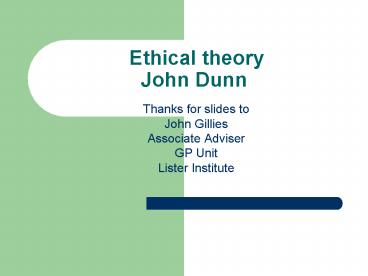Ethical theory John Dunn - PowerPoint PPT Presentation
1 / 28
Title:
Ethical theory John Dunn
Description:
pp.175-185 Ed Singer P. Blackwell 1991. GMC duties of a Doctor ... Elizabeth is dying from disseminated bone cancer at home. ... P. Blackwell 1991. Video ... – PowerPoint PPT presentation
Number of Views:87
Avg rating:3.0/5.0
Title: Ethical theory John Dunn
1
Ethical theory John Dunn
- Thanks for slides to
- John Gillies
- Associate Adviser
- GP Unit
- Lister Institute
2
(No Transcript)
3
(No Transcript)
4
Ethics and ethical theory.
- Applied (e.g. medical) ethics aims to give
guidance on what to do in particular moral
problems or controversies - Ethical theory attempts to offer general rules or
concepts relating to how individuals,
institutions, the NHS and government should act
or behave
5
Theoretical approaches.
- Deontological
- Utilitarian/ Consequentialist
- Virtue Ethics
6
Deontological theories
- These stress the idea of duty. (Gr. deontos
duty, logos discourse). Whether an act or policy
is right or wrong is determined by the action
itself, rather than the consequences. The
intentions of the person are seen as morally
relevant. - May be based on divine command, on works of
Kant, Thomas Nagels idea of deontological
constraints. - ONeill O. Kantian Ethics. In A Companion to
Ethics. pp.175-185 Ed Singer P. Blackwell 1991.
7
GMC duties of a Doctor
- Front page of Good Medical Practice
- How many can you name ?
8
Problems
- Good intention
- Bad effect
9
Deontology in Practice
- Elizabeth is dying from disseminated bone cancer
at home. Her GP gives increasingly large doses
of diamorphine by syringe driver to relieve her
pain and suffering. She dies after a few days
from a bronchopneumonia. - The diamorphine, by causing respiratory
depression, may hasten her death. It is a
foreseen but unintended consequence of the GPs
use of opiate. The action is morally justified by
the intention of the GP to relieve pain and
suffering
10
Doctrine of double effect
- The act must be good or at least morally neutral
- The agent must only intend the good effect. The
bad effect may be foreseen, tolerated and
permitted but not intended - The bad effect must not be means to the good
effect - The good effect must outweigh the bad effect
11
Utilitatarianism Consequentialist approaches
- Based on the idea that the right action in any
situation is that which produces the best
consequences or outcomes - Most influential of these approaches is
Utilitarianism maximising utility (the good) or
happiness - Goodin R Utility and the good. in Companion to
Ethics. pp.241-248 Ed Singer P. Blackwell 1991.
12
Video 1
- From a deontological point if view was the Drs
actions correct ? - Did the Dr in the video behave in a morally
correct way?
13
Utilitarianism and EBM
- Evidence-based medicine (EBM) is at heart an
Utilitarian approach - Greatest good for greatest number
14
Problems EBM
- Evidence is based on a reductionist paradigm--
look at small parts of the picture and
extrapolate-- (inherently non-holistic) - Evidence is nearly always based on data derived
from populations, then applied to individuals,
(the ecological fallacy)
15
Problems EBM
- Hierarchy of evidence-- the dominance of the RCT
privileges pharmacological interventions over
others (e.g. in hypertension) - Much research funding comes from the
pharmaceutical industry--more difficult to
identify funding for psychological/ other
interventions
16
Ethics of utilitarian EBM
- Much evidence is on interventions in single
diseases, within circumscribed age limits, in
very well defined situations - The content, direction and peer review of
research is driven by the scientific community
rather than by consumers or patients - In GP, we treat many conditions for which
evidence is scanty, contradictory or absent
17
How should we use evidence?
The problem The facts dont tell you what to
do Erkki Vartiainen, 2003 The patient in front
of you was not in the trial Jonathan Rees,
dermatologist 2004
18
Video 1
- From a utilitarian point of view was the Drs
actions correct ? - Did she ensure the greatest good for the greatest
number ?
19
(No Transcript)
20
(No Transcript)
21
(No Transcript)
22
Virtuous Doctor
- Must combine science and compassion
- How do we do this ?
- It is challenging enough to remember the science
23
Edwins Doctor
- Read Edwins description of his Doctor
- What qualities did he have ?
24
Perceptual capacity Virtue
- Helps you to decide what to do when you dont
know what to do. - This is one of the greatest challenges facing a
GP day to day
25
(No Transcript)
26
(No Transcript)
27
Video 1
- Did the Dr behave in a virtuous manner
- Did the Dr take into account the patients
situation and concern was she emotionally
involved ?
28
Virtue in Practice
- Bob 63 diabetes ,stage 3 renal failure
,Hypertension, Hypercholesterolaemia, - BP137/86
- Renal Clinic advise 5th antihypertensive to get
BP below target of systolic 130 in line with
guidelines - Bob then on 16 medications doesn't like taking
tablets - 10 year risk of CVD event falls from 22 to 20
- NNT 10 years 50
- What do you do ?































